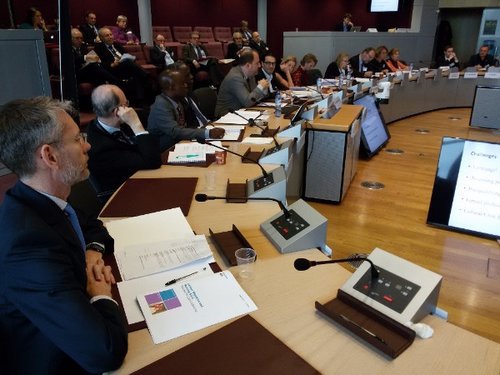Today the European Commission convened a Dialogue Seminar focussed on looking beyond the immediate humanitarian crisis provoked by the recent influx of migrants and refugees on European soil. COMECE, CEC, and CCME gathered experts and Church leaders from across Europe to discuss models of integration, best practices, and the fundamental values that guide integration within the European Union. Dóra Kanizsai-Nagy, head of the RCH Refugee Ministry also attended the Seminar and held a short presenation on the Models of integration into the labour market in a Hungarian context.
Welcoming migrants, asylum seekers, and refugees became an urgent challenge, especially for Member States with an external border of the EU. The crisis became acute during the summer of 2015 and moved migration issues to the top of the EU political agenda.
It was gratifying to witness the preparedness of public authorities and the hospitality of many Christian Churches and religious communities throughout Europe. In their everyday work, Churches in meaningful ways contributed to the integration of the newly arrived. In their work they were addressing migrants and refugees as well as host societies.
The greater challenge, however, is the long-term integration of migrants and refugees into their new home societies and respective labour markets. This is a challenge that all within the EU will face for years to come. It is also a challenge that requires clear policy objectives, coordinated response, and concerted effort from both migrants and European societies. Close cooperation between public authorities at all levels, civil society, Churches and religious communities will strengthen responses to the crisis.

Dialogue Seminar participants introduced a number of models for integration, often based on the deep experience of Churches in welcoming migrants and refugees to Europe. They also exchanged integration success stories, and shared ideas on how to cultivate a more positive public image of all migrants and refugees in Europe.
All participants were concerned with the personal and human aspect of the current crisis, and stressed that it is not about statistics and economics, but about human dignity and common good. They also noted that the Churches in Europe are often the first and most important point of contact to migrants and refugees. Through welcoming Christian communities, newcomers find the support they need to begin adapting to their new society. Participants committed themselves to providing space for encounter between migrants and refugees and host societies, and a space for addressing fears of receiving communities.
Source: CEC